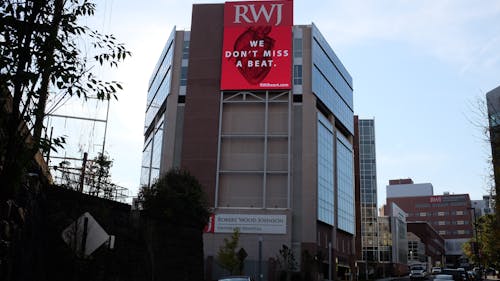RWJUH receives $809,218 for violence intervention program

In January, Gov. Phil Murphy (D-N.J.) announced that Robert Wood Johnson University Hospital (RWJUH) would receive more than $800,000 from the federal American Rescue Plan for its work in the New Jersey Hospital-Based Violence Intervention Program (NJHVIP).
Elaine Hewins, the domestic violence education and awareness program coordinator at RWJUH, said the funds would contribute to violence intervention programs at both the hospital and its partnering organizations.
Specifically, she said the funds would be used for patient transportation, clothing, food and cell phones. The investment will also benefit employees, with a portion used for staff salaries and violence prevention and reduction training.
Hewins said that the violence intervention program at RWJUH uses a multifaceted approach and employs frontline violence care specialists and regular medical care staff.
"The frontline violence intervention specialists respond bedside in the emergency department to patients who have had injury due to community violence or other kinds of interpersonal violence," Hewins said. "They respond to try to build rapport, build trust and then offer support, including safety planning services and trauma-informed care for violently injured people."
Ariel Jimenez, a violence intervention specialist at the RWJUH Hospital Violence Intervention Program, said that the program treated 6,213 victims of crime in 2022.
He said patients were victims of multiple types of violence, including stabbings, homicide, domestic violence and physical assault. The unit serves patients from Plainfield in Union County, Franklin Township in Somerset County and all of Middlesex County, Hewins said.
Jimenez said he works directly with the patients through trauma-informed care like mental health counseling and educating them on helpful resources.
"As the violence intervention specialist … (we) respond to the underserved population of crime victims and community violence," he said.
Hewins said that she believes the work of violence intervention specialists is vital to the program's success.
"So someone like Ariel, who is a credible messenger, responding at a critical time in the patient's life, to build trust and offer support and services can make that difference," she said.
Hewins said that the violence intervention program also treats patients indirectly affected by violence, for example, the mother of a homicide victim. Treating ancillary victims sets RWJUH's program apart from others who do not focus on this population.
She also said that their program often treats young men of color as they are disproportionately affected by community violence.
"Often these crime victims are young Black and brown men, they may experience a stigma about asking for help or going to counseling," she said. "So when you combine that stigma, lack of resources and then lack of a devoted agency, they're just kind of left to deal with it themselves."
Hewins said the program's creation at RWJUH especially helps marginalized people who would otherwise not receive proper care since government services often forget them.
The program strives to educate the public about the origins of this violence, such as racism, inequity and underfunded minority communities, she said.
Hewins said that she believes the program is overall successful, and its success is evident in the communities the program serves.
"We're seeing a reduction in traumatic symptoms for patients who engage with their violence intervention specialist and with a therapist at prep," she said. "But even if they don't agree to go to therapy, working with the violence intervention specialist leads to a reduction in traumatic symptoms because they're getting the message that you're important, someone cares (and) help is available."



